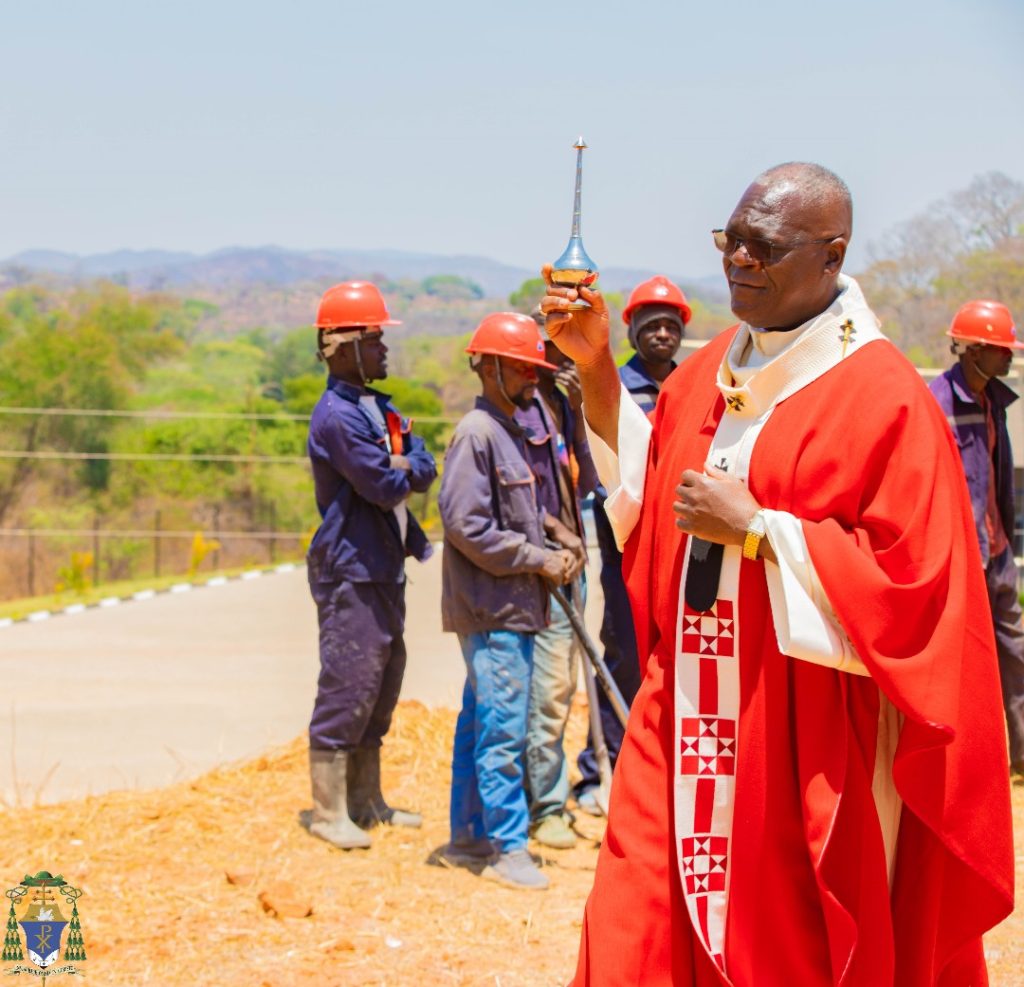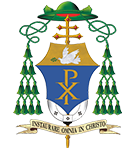Archbishop Banda dedicates New Chapel at Adrian Mung’andu to St. Engelbert Kolland

…Honoring His Legacy of Faith and Sacrifice
On Monday, October 21, 2024, Archbishop of Lusaka, Most Rev. Dr. Alick Banda celebrated Mass to commemorate the commencement of the construction of the Chapel at Adrian Mung’andu International Boys College, Njolwe.
The construction of the Chapel is sponsored by Austria-based Blessed Engelbert Foundation, which serves as a legacy for Engelbert Kolland OFM Cap, who was Canonised on October 20, 2024 alongside his companions who suffered martyrdom in Syria for refusing to renounce their faith and convert to Islam.
Archbishop Banda who blessed the construction site immediately after Mass dedicated the Chapel St. Engelbert Kolland OFM Cap.
“Today, we offer this mass, an inauguration of the works on the Chapel, a day immediately after the Canonisation of Engelbert Kolland, OFM Cap. and his companions, who suffered martyrdom in Syria for refusing to renounce his faith and convert to Islam,” he said.

Engelbert, was born in Ramsau on 21 September 1827. The following day he was baptised in the Parish Church of Zell am Ziller, Austria, and thus accepted into the community of the church. He grew up in very poor surroundings, was a very lively boy, who already as a school child liked to pray often and diligently.
In 1847, he asked to be admitted in the convent of the Friars Minor in Salzburg to serve the Lord in the Order of St Francis of Assisi. He completed the strict novitiate without grumbling and with much joy. On 22 November 1850 he made his solemn profession and took the name Engelbert which means “Bright Angel”
On 13 July 1851, Engelbert Kolland was ordained a priest. His motto was “My God and my all”. After extensive philosophical and theological studies in Schwaz, Bozen, Hall and Kaltern. Brother Engelbert spent several years in Bozen, where he devoted himself above all to the study of foreign languages.
In the process, the Zillertal native, who had always struggled with learning, turned out to be a true linguistic genius and learned not only English, French, Italian and Spanish, but also Arabic.
During these years of study, Brother Engelbert longed to go on mission to proclaim the gospel all over the world. In 1855, the young Franciscan’s wish was fulfilled. He was sent to the Holy Land as a missionary.
Engelbert spent his first two months in the Church of the Holy Sepulchre in Jerusalem, before being transferred to St Paul’s Monastery in Damascus. He encountered Oriental customs with great curiosity and openness.
It soon became clear to him that as a pastor, he not only had to take care of church matters and the administration of the sacraments, but also the sick, to bring runaway wives back home and also help people with all kinds of family and financial worries.
His sincere struggle for people in pastoral care, his untiring willingness to help and his excellent knowledge of Arabic opened the hearts of the faithful in the vicinity, who soon simply called him “Abouna Malak”, which means “Father Angel”.
Soon after Brother Engelbert’s arrival in Damascus, tensions repeatedly arose between the Christian minority and Muslim groups, especially the Druze, a violent Muslim sect.
In July 1860, there was a great persecution of Christians in Damascus, to which Brother Engelbert and his confreres in St Paul’s Monastery also fell victim. The brothers heard the raging in the city, but stayed in the monastery, believing themselves safe behind the monastery walls.
A traitor who had once worked at the monastery showed the killers a secret entrance to the monastery precinct. Three Maronite Christians, who were also in the monastery, were the first victims, after which seven Franciscan fathers were killed. Both the laity and the religious had steadfastly confessed their faith in the presence of their murderers.
The youthful Engelbert had tried to escape over the neighbouring house roofs and get to safety. A woman gave him a white cloak as camouflage, but it was too short and the brown habit and the bare feet in sandals gave Engelbert away when his pursuers caught up with him.
Surrounded by about twenty pursuers, he asked one, “Friend, what have I done to you?” The latter replied in amazement, “Nothing, but you are a Christian!” Engelbert answered, “I am a Christian, I remain a Christian. Even more, I am a servant of Christ, a priest of the Catholic community here.”
He made a sign of the cross. He was then struck by a blow with a double-bladed axe. When he also resisted further requests to renounce the faith, a fatal axe finally hit him. He died shortly after midnight on 10 July 1860 at the age of 33.
Martyrdom came “with that calm and that holy freedom that the Lord grants to those who defend his cause.” Engelbert Kolland made himself a servant of others, creative in doing good, steadfast in difficulties, and generous to the end.
“We dedicate this chapel to him, confidently asking for his intercession so that we too can follow Christ, follow HIM in the service of God and neighbour and become witnesses of hope to a world plagued by conflict, poverty, intolerance and uncertainty, injustice and disrespect for human rights and dignity.” Archbishop Banda added.

